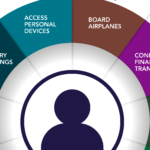Tags Blockchain Digital Transformation Identification
Georgia is pioneering a new system for registering land titles, property transactions, mortgages, demolitions and notary services by using the same blockchain technology that underpins the virtual currency bitcoin. The idea behind this initiative is that blockchain technology relies on a distributed database to store information accurately and securely. Once entered into a block in the chain, data cannot be altered, thus providing a clear picture of the sequence of transactions. So far, about 100,000 land titles have been registered in the new system since it began in April 2016.
Georgia is not the only country turning to blockchain technology for record keeping: the Chinese government is using it to fight fraud; Estonia has used a blockchain-based service that enables people to trade stocks; and Senegal is planning to use blockchain technology to introduce a national digital currency. Georgia, however, is believed to be the first state to implement a blockchain-based system for both land registration and transactions.
Potential benefits include:
- increasing the reliability, safety and transparency of National Agency of Public Registry services
- increasing public confidence in property-related record keeping
- bolstering property rights
- ensuring the legitimacy of citizens’ documents without exposing confidential information
Potential risks include:
- platforms losing developer interest and support
- flaws in blockchain code and smart contracts
- encryption algorithms being cracked by quantum computers
- state intervention
- some metadata being insecure (e.g. originating IP addresses, the value of transfers, other linked addresses, etc.)
 BFC Bulletins Monthly News Digest
BFC Bulletins Monthly News Digest




